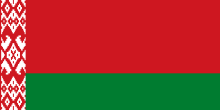Belarus at the Summer Olympics
| Belarus at the Olympics |
|||||||||
|---|---|---|---|---|---|---|---|---|---|
 |
|||||||||
| IOC code | BLR | ||||||||
| NOC | Belarus Olympic Committee | ||||||||
| Website |
www |
||||||||
| Medals |
|
||||||||
| Summer appearances | |||||||||
| Winter appearances | |||||||||
| Other related appearances | |||||||||
|
|
|||||||||
Athletes from Belarus began their Olympic participation at the 1952 Summer Games in Helsinki, Finland as part of the Soviet Union (IOC code: URS). After the Soviet Union disbanded in 1991, Belarus, along with four of the other fourteen former Soviet republics, competed in the 1992 Winter Olympics (held in Albertville, France) as the Unified Team. Later in 1992, eleven republics joined Belarus to compete as the Unified Team at the Summer Games in Barcelona, Spain. Two years later, Belarus competed for the first time as an independent nation in the 1994 Winter Olympics, held in Lillehammer, Norway. Since 1994, Belarus has won medals at each Winter and Summer Olympics it has participated in.
Athletes from the Soviet Union began participating in the Olympic Games in 1952, winning 194 total medals in the Winter Games and 1010 at the Summer Games for a total of 1204 medals. Of those medals, 473 were gold, 376 were silver and 355 were bronze. The Belarusian collection of medals began with Mikhail Krivonosov winning silver in the hammer throw at the 1956 Summer Olympics in Melbourne, Australia. The Soviet Republic's first gold medal was won by Leonid Geishtor and Sergei Makarenko in the 1000 metre pairs canoe event during the 1960 Summer Games in Rome, Italy. The Soviet Union first competed in the Winter Olympics in 1964, located in Innsbruck. In 1988, the Soviet Union competed for the last time as a unified country.
...
Wikipedia
